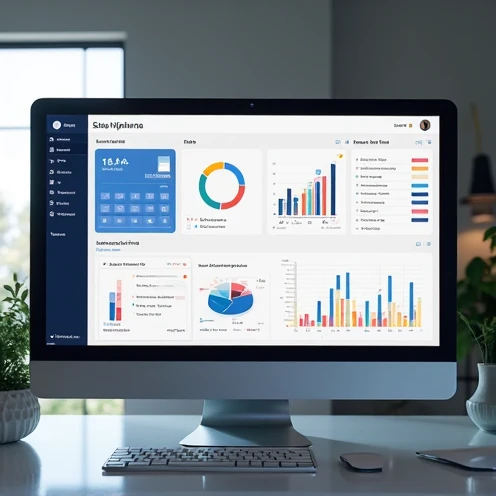Customer Relationship Management (CRM) has transformed the way businesses interact with their customers. Today, technology makes it easier than ever to build strong, long-lasting relationships. Among the innovations, Cloud CRM Solutions stand out as a game-changer. These platforms give businesses of all sizes the ability to manage leads, track sales, and enhance customer experiences without relying on expensive infrastructure.
Iklan Google AdSense
In addition, companies can now access real-time data from anywhere in the world. This flexibility empowers teams to stay connected, collaborate effectively, and make faster decisions. By adopting Cloud CRM Solutions, organizations position themselves to scale, innovate, and compete in an ever-changing digital market.
What Makes Cloud CRM Solutions Different
Unlike traditional CRM software installed on company servers, Cloud CRM Solutions run entirely online. This means businesses avoid costly hardware setups and complicated maintenance. All essential tools and data live in the cloud, ensuring seamless access from desktops, tablets, or mobile devices.
Iklan Google AdSense
Furthermore, these solutions are designed to be user-friendly. They provide intuitive dashboards, smart analytics, and powerful automation. As a result, teams save time, reduce human errors, and focus more on building meaningful customer relationships.
The Role of Cloud Technology in CRM
Cloud technology supports constant updates, which guarantees that businesses always use the latest features. Security measures are also top-notch, keeping sensitive customer data safe. By removing the burden of manual upgrades, companies gain more efficiency and agility in their daily operations.
Why Businesses Are Moving to Cloud CRM Solutions
More companies are adopting cloud-based systems because they deliver value quickly. Instead of waiting weeks for installation, teams can start using the platform within hours. This rapid implementation accelerates productivity and shortens the path to customer success.
Another factor is scalability. Businesses can easily add or remove users depending on their needs. Cloud CRM Solutions grow with the company, ensuring they remain relevant through each stage of expansion.
Cost-Effective and Flexible
One of the biggest reasons companies love cloud systems is affordability. Subscription models allow organizations to pay only for what they use. This flexibility gives startups and small businesses the same competitive tools as large enterprises without breaking the bank.
Key Features of Cloud CRM Solutions
Cloud CRM platforms are packed with features designed to streamline workflows. From lead generation to after-sales support, every step of the customer journey is carefully managed.
These features include automated email campaigns, task scheduling, advanced analytics, and real-time reporting. By combining these tools, teams gain a 360-degree view of their customers, making every interaction personalized and impactful.
Collaboration Made Simple
Since data is accessible to everyone, collaboration becomes effortless. Sales, marketing, and customer service teams can work together seamlessly. This level of integration improves communication and ensures customers enjoy a consistent experience at every touchpoint.
How Cloud CRM Solutions Improve Customer Relationships
Strong customer relationships are the foundation of long-term success. Cloud CRM Solutions help businesses deliver exceptional service by organizing customer data into easy-to-understand profiles.
With detailed histories of customer interactions, companies can anticipate needs and respond faster. This proactive approach strengthens trust and builds loyalty over time.
Personalization at Scale
Personalization is no longer limited to big corporations. With cloud-based platforms, even small businesses can tailor their communication. Whether through personalized emails, product recommendations, or follow-up messages, customers feel valued and understood.
Cloud CRM and Sales Performance
Sales teams benefit the most from CRM tools. By centralizing leads, opportunities, and pipelines, Cloud CRM Solutions eliminate confusion and inefficiency. Managers gain insights into the entire sales funnel, enabling them to forecast with greater accuracy.
Additionally, automation reduces repetitive tasks. Sales representatives can then concentrate on nurturing prospects and closing deals, driving overall revenue growth.
Data-Driven Decision Making
Analytics tools empower sales teams to identify patterns and predict customer behavior. With real-time data, they can adjust strategies quickly, ensuring they always stay ahead of competitors.
The Future of Cloud CRM Solutions
The future of CRM lies in artificial intelligence, automation, and seamless integrations. Cloud platforms are already adopting these innovations to enhance customer engagement further. Businesses can expect predictive analytics, AI-driven chatbots, and smarter workflows to become the norm.
As technology continues to evolve, Cloud CRM Solutions will remain central to digital transformation. They are not just tools but strategic assets that redefine customer management.
Integration with Other Business Tools
Cloud CRMs now integrate with email platforms, social media channels, and e-commerce systems. These connections create a unified ecosystem, making it easier to track customer journeys from awareness to purchase.
Choosing the Right Cloud CRM Solution
Selecting the right CRM depends on business size, budget, and goals. Companies must evaluate features such as scalability, security, ease of use, and customer support.
Additionally, businesses should ensure that the chosen platform integrates seamlessly with existing tools. A smooth transition helps teams adapt faster and maximize the return on investment.
Popular Cloud CRM Platforms
Well-known solutions like Salesforce, HubSpot, and Zoho offer robust features. However, the best choice always depends on a company’s unique requirements. Testing free trials and consulting user reviews can help decision-makers find the perfect fit.
Common Challenges and How to Overcome Them
Despite their advantages, adopting Cloud CRM Solutions may present challenges. Some companies struggle with user adoption, while others face issues with data migration.
To overcome these hurdles, businesses should provide proper training and continuous support. Clear communication about the benefits of CRM ensures employees embrace the change with confidence.
Building a Culture of CRM Adoption
Success relies on more than just technology. Organizations must build a culture where CRM use is standard practice. By celebrating small wins and recognizing active users, companies encourage long-term adoption.
Cloud CRM Solutions for Small Businesses
Small businesses often believe CRM is only for large corporations. However, cloud-based platforms make these tools accessible to everyone. With affordable pricing and scalable features, startups can compete on equal footing.
These solutions simplify complex processes, allowing small teams to achieve more with fewer resources. As a result, they experience growth without overwhelming their operations.
Empowering Entrepreneurs
Entrepreneurs benefit greatly from real-time insights. Cloud CRM dashboards display key performance metrics instantly, helping business owners make informed decisions quickly.
Embracing Cloud CRM for a Competitive Edge
Cloud CRM Solutions are no longer optional—they are essential for survival in today’s competitive market. By leveraging the power of cloud technology, businesses strengthen customer relationships, improve efficiency, and boost sales.
Those who invest early will enjoy long-term rewards, while those who delay may struggle to keep up. The time to embrace cloud-based CRM is now.
Iklan Bersponsor Google






